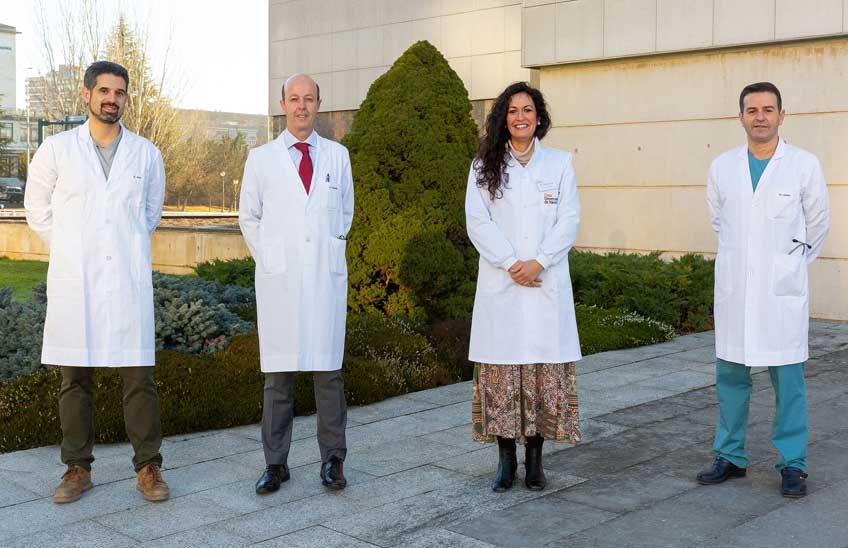Pfizer selects a research of the Cima University of Navarra on cardiac amyloidosis
The pharmaceutical company-backed study aims to develop human models of this heart disease using stem cells, cell reprogramming techniques and bioengineering.

FotoManuel Castells<br>/Investigadores del Cima y la Clínica Universidad de Navarra participantes en el proyecto.
17 | 02 | 2022
The US multinational pharmaceutical company Pfizer, through its Global Medical Grants programme, has selected research from Cima University of Navarra to study cardiac amyloidosis, a rare, underdiagnosed and potentially fatal heart disease.
The project aims to develop new human models of this pathology with state-of-the-art technology in the use of stem cells, cell reprogramming techniques and bioengineering. The research is led by Dr. Olalla Iglesias, a researcher in the Regenerative Medicine Programme at Cima.
Pfizer Global Medical Grants is a worldwide competitive call within the bio-health field that supports pioneering initiatives at research and Education in health to improve the treatment and care of patients with unmet medical needs. In this edition, 8 projects have been selected out of 59 submitted.
Advanced cutting-edge bioengineering
Cardiac amyloidosis is a rare, rapidly progressive disease, with a prevalence of less than 1 per 100,000 population, that occurs when an abnormal protein with an unstable structure, called amyloid, folds, aggregates and eventually deposits in the heart tissue. This can cause alterations in the structure and function of the heart and can lead to the development development of cardiomyopathy or heart failure, cardiovascular diseases that are among the leading causes of death in the world.
Specifically, the research of Cima focuses on the study of cardiac amyloidosis due to transthyretin, a protein that is mainly synthesised in the liver and is responsible for the transport of other substances in the body. "Using state-of-the-art techniques in regenerative medicine, we aim to develop an in vitro human model for this disease. This involves generating liver cells that serve as source for the abnormal transthyretin protein, and cardiac cells that develop the structural and functional alteration characteristic of the disease. To obtain these cells, we will use adult cells obtained from patients with the disease, which we will convert into pluripotent stem cells at laboratory using cell reprogramming techniques," says Iglesias. In achieving project , "we will also apply cutting-edge methodology based on the use of new manufacturing techniques (3D printing) in combination with biomaterials and biophysical stimulation systems," explains the researcher.
Generate diseased organs to propose treatments
Current conventional treatments for transthyretin amyloidosis of the heart are rarely effective. They usually focus on relieving the symptoms of cardiomyopathy or heart failure and on slowing or stopping the training and accumulation of the abnormal protein deposits. In an advanced stage of the disease, heart and even liver transplantation may be necessary. According to Iglesias, "the lack of in-depth knowledge on the mechanisms that lead to the disease makes the prognosis for patients poor. Our aim with this project is to develop within two years a human model for this disease that will represent a great step forward in the knowledge of the mechanisms involved in the development and progression of the disease, and that can be used as a platform for testing new drugs in order to evaluate possible treatments that can be transferred to the internship clinic".
